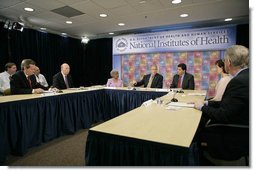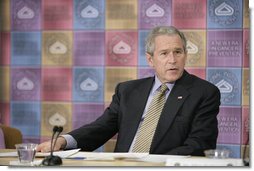
 |
For Immediate Release
Office of the Press Secretary
January 17, 2007
President Bush Participates in a Roundtable on Advances in Cancer Prevention
National Institutes of Health
Bethesda, Maryland
|
|||||
![]() Fact Sheet: A New Era in Cancer Prevention
Fact Sheet: A New Era in Cancer Prevention
![]() In Focus: Health Care
In Focus: Health Care
11:11 A.M. EST
THE PRESIDENT: Thanks, Michael. I appreciate you joining us. I love coming to the NIH, it is an amazing place. It is an amazing place because it is full of decent, caring, smart people, all aiming to save lives. And I truly believe the NIH is one of America's greatest assets. And it needs to be nourished.
 And I'm real pleased to be working with Elias and the good folks who
work here to make sure that there's ample resources to fund these
incredible projects that are taking place. And we'll talk about some of
them today. The purpose of the meeting is to let the American people
understand what kind of work takes place here, and some of the practical
applications of the discoveries that are being made. Obviously, we're
all very concerned about cancer. And, John, thank you for joining us.
And I'm real pleased to be working with Elias and the good folks who
work here to make sure that there's ample resources to fund these
incredible projects that are taking place. And we'll talk about some of
them today. The purpose of the meeting is to let the American people
understand what kind of work takes place here, and some of the practical
applications of the discoveries that are being made. Obviously, we're
all very concerned about cancer. And, John, thank you for joining us.
First, I'm pleased that we're funding cancer research. We're up about 25 percent or 26 percent since 2001; it's a commitment that I made when I first came to Washington, it's a commitment we're keeping. And the reason why it makes sense to spend taxpayers' money on cancer research is that we can make some good progress, and have. Interestingly enough, this is the second consecutive year there was a drop in the number of cancer deaths in the United States. And the drop this year was the steepest ever recorded. And the reason I bring that statistic up is that progress is being made. In other words, there are tangible results as a result of the research that takes place around the country, and a lot of it focused here at the NIH.
I had a fantastic experience today with some smart docs talking about how they can use genetic research, which Francis will talk about, to create cures for a lot of diseases. We particularly focused on kidney cancer today. And I strongly believe that it makes sense for us to progress and take advantage of the research that the Human Genome Project has yielded.
However, I really want to make it clear to the Congress that I hope they pass legislation that makes genetic discrimination illegal. In other words, if a person is willing to share his or her genetic information, it is important that that information not be exploited in improper ways -- and Congress can pass good legislation to prevent that from happening. In other words, we want medical research to go forward without an individual fearing of personal discrimination.
Finally, I'm real pleased about the announcement made earlier on the HPV virus -- vaccine. I don't know if our citizens know, but 70 percent of all cervical cancer comes from HPV virus. And as a result of good work here and other places, a vaccine has been developed that the government will dispense to those who qualify, all aiming to continue to build on the progress being made in dealing with cancer.
 And, so, I'm very pleased with the jobs you folks are doing here. And
I'm so grateful for you all to join us; I'm looking forward to hearing
what you have to say. You'll be happy to hear my long-windedness is
about to end. (Laughter.) But thanks for coming.
And, so, I'm very pleased with the jobs you folks are doing here. And
I'm so grateful for you all to join us; I'm looking forward to hearing
what you have to say. You'll be happy to hear my long-windedness is
about to end. (Laughter.) But thanks for coming.
* * * * *
THE PRESIDENT: That's good. I wish that people could walk the halls here at the NIH and meet the scientists and employees of this fantastic organization. It is amazing. You talk about young and smart and bright and excited -- with all due respect, Docs -- (laughter) -- you've got a lot of really bright people here, which is another subject for another time. But we better make sure we get the right education working to make sure that our scientists are given the tools and encourage young kids to become scientists in the first place, so that these halls remain full of people. Because as Doc said -- he said, if we're not doing it, somebody is going to, and we want it done here in America. We want -- I mean, we want to welcome scientists here, too.
And the other thing that struck me was that people from around the globe that are here working. So, anyway, you're doing a good job. We're spending about $28.6 billion here at the NIH, which was doubled from 15 years ago, I think it was, or something like that.
Thank you. Michael.
* * * * *
THE PRESIDENT: John, first, before you do it -- if you don't mind -- National Cancer Institute. Tell people what it is, how it works, if you don't mind.
* * * * *
DR. NIEDERHUBER: It's a very exciting time in my long career -- which you were kind enough to point out to me, sir.
THE PRESIDENT: Well, I wanted the taxpayers to understand we've got a man of expertise here -- (laughter) -- setting you up for success.
DR. NIEDERHUBER: I've never experienced a time when science has been so exciting and been moving at such a rapid pace. This is just an unbelievable opportunity. I'm very honored to be here.
THE PRESIDENT: Thanks for serving.
DR. NIEDERHUBER: I'm honored to be here, sir.
THE PRESIDENT: A man who doesn't like all the initials. (Laughter.)
* * * * *
THE PRESIDENT: Thanks for coming. I'm excited and I appreciate the work being done here in Washington, the work being done at the grassroots level. I thank you for your articulate presentation, both of you all. And this government supports what's happening in order to save lives, and we will.
Thanks.
END 11:54 A.M. EST